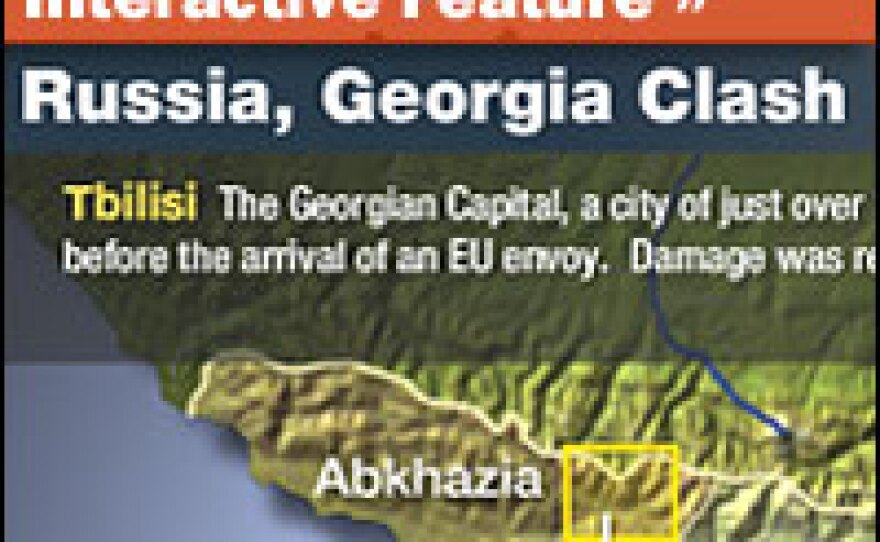Russia's President Dmitry Medvedev has ordered his troops to halt military action in Georgia, but a peace plan comes with strings attached. Russia wants Georgia to agree in writing not to try to retake separatist areas that Moscow supports.
The French have taken the lead on this diplomatic effort to end the fighting. The Bush administration has been worried about the implications for the young democracy it supports in Georgia, but seems to be looking for ways to punish Russia.
Russian officials say their goal in the conflict wasn't to topple Georgia's President Mikhail Saakashvili, but they don't hide the fact that they don't like him.
Medvedev on Tuesday called Saakashvili a lunatic who started the conflict by invading the separatist region of South Ossetia.
"All those crazy people are very particular, because when they smell blood it is impossible to stop them," Medvedev said. "Therefore, you need to make a surgery to stop this problem."
Medvedev said Russia's military has now accomplished what it set out to do and has agreed to a cease-fire. French President Nicolas Sarkozy then took the agreement to Georgia.
Sarkozy said the agreement does not resolve the status of South Ossetia or another breakaway region, Abkhazia, but rather is aimed at improving the situation on the ground for civilians caught up in the conflict.
'An Emergency Situation'
"We are in an emergency situation," Sarkozy said. "Our objective was not to settle all the problems."
In Brussels, NATO ambassadors met to deal with the conflict Tuesday, and Secretary General Jaap de Hoop Scheffer said the mood around the table was in support of Georgia, an ex-Soviet republic still trying to join the alliance.
"Allies reiterated in very strong terms the full respect necessary for the sovereignty and territorial integrity of Georgia," de Hoop Scheffer said. "And that is more than a phrase in a period of time when that territorial integrity is not respected by Russia."
Kurt Volker, the U.S. ambassador to NATO, said several members argued that it will no longer be business as usual with Russia. But the Bush administration, a strong supporter of Georgia's embattled president, doesn't seem to have come up with any concrete way to punish Russia for what officials in Washington call an act of pure aggression.
They are looking at some mainly symbolic moves, like putting off joint military exercises with Russia, for example.
Rice Urges Calm
When Secretary of State Condoleezza Rice addressed reporters briefly at the White House on Tuesday, she didn't mention any of that. She said only that calm needs to be restored.
"I want to make very clear that the U.S. stands with the territorial integrity of Georgia, for the sovereignty of Georgia, that we support its democratically elected government and its people," Rice said. "We are reviewing our options for humanitarian and reconstruction assistance to Georgia, but the most important thing now is that these military operations need to stop."
State Department spokesman Robert Wood said that Russia's actions have affected U.S.-Russian relations, but he reminded reporters that there are plenty of other issues that the U.S. and Russia have to work on together, from Iran to missile defense.
All that is likely to get even more complicated now.
Copyright 2022 NPR. To see more, visit https://www.npr.org. 9(MDAzMjM2NDYzMDEyMzc1Njk5NjAxNzY3OQ001))







